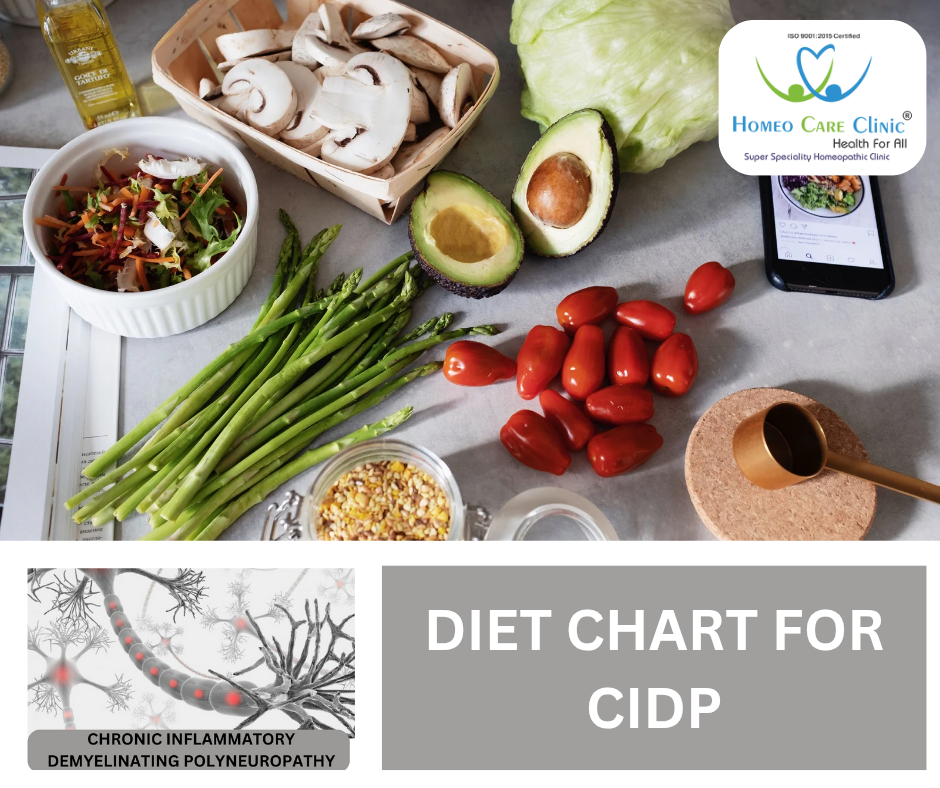Diet Chart for CIDP (Chronic Inflammatory Demyelinating Polyneuropathy)

Importance of Diet in CIDP
CIDP is an autoimmune neurological disorder in which peripheral nerves as well as their myelin sheath get involved, causing chronic inflammation, numbness, muscle weakness, and fatigue. While treatment is almost entirely dependent on drugs like steroids and immunoglobulins, a correct diet helps to:
- Relieve systemic inflammation
- Support nerve repair and regeneration of myelin
- Balance the immune system
- Improve energy level and prevent muscle loss
- Prevent side effects of long-term medication
Goals of Diet Therapy
- Include anti-inflammatory and antioxidant-dense foods
- Maintain nerve function with essential vitamins and minerals
- Supply adequate protein for muscle and tissue repair
- Support digestive and metabolic function
- Help sustain a healthy weight and prevent nutritional deficits
Daily Diet Chart for CIDP
| Time | Vegetarian Option | Non-Vegetarian Option |
| 6:30 AM | Warm water with lemon or fenugreek seeds | Warm water with soaked almonds and a date |
| 7:30 AM (Breakfast) | Vegetable oats upma or moong dal chilla with mint chutney | 2 boiled eggs with multigrain toast OR masala omelette with spinach |
| 10:30 AM (Snack) | Fresh fruit (apple, banana, or papaya) + a handful of walnuts | 1 boiled egg + coconut water or buttermilk |
| 1:00 PM (Lunch) | Brown rice with masoor dal + sautéed spinach and beet-carrot salad | Grilled chicken or fish with rice and sautéed green beans |
| 2 rotis + lauki sabzi + curd | Chicken curry with soft roti + cucumber-onion salad | |
| 4:00 PM (Snack) | Roasted makhana or sunflower seeds + herbal tea (tulsi, ashwagandha) | Chicken broth or vegetable soup + a few roasted peanuts |
| 6:30 PM (Evening Drink) | Herbal tea or ginger-cinnamon decoction | Lemon-coriander soup or chamomile tea |
| 8:00 PM (Dinner) | Khichdi with vegetables like lauki, carrots, and turmeric | Grilled fish or boiled chicken stew with mashed sweet potato |
| 2 soft rotis + tur dal and spinach bhaji + small bowl of curd | Chicken soup with bottle gourd and beans | |
| Before Bed (9:30 PM) | Warm milk with turmeric or nutmeg, OR almond milk | Warm almond milk with a pinch of cinnamon |
Key Nutrients for CIDP Management
- Omega-3 Fatty Acids
- Help reduce nerve inflammation and assist with myelin repair
- Sources: Flaxseeds, chia seeds, walnuts (veg); fatty fish like salmon, sardines (non-veg)
- Vitamin B12 and B-Complex
- Critical to nerve conduction and the prevention of further demyelination
- Sources: Dairy, curd, paneer, spinach, whole grains, eggs, chicken, fish
- Vitamin D and Calcium
- Aid transmission of nerves and undo steroid-induced bone loss
- Sources: Sunlight, milk, ragi, paneer, eggs, fish
- Magnesium and Zinc
- Reduce the excitability of nerves and uphold immunity
- Sources: Pumpkin seeds, almonds, legumes, spinach, seafood
- Antioxidants (Vitamin C, E, A, Selenium)
- Help fight oxidative stress on nerve cells
- Sources: Amla, citrus fruits, papaya, sunflower seeds, spinach
Foods to Avoid
- Refined carbohydrates and processed foods: Sweets, candies, biscuits – induce inflammation
- Maida foods: White bread, fried snacks, noodles
- Greasy and fried foods: Pakoras, samosas, puris
- Carbonated drinks and soft drinks
- Artificial preservatives and sweeteners
- Salty foods: Papads, instant mixes, pickles
- Alcohol and caffeine can interfere with nerve repair and sleep
Lifestyle Tips for Support
- Eat regular, small, frequent meals to prevent fatigue
- Drink normal quantities of water regularly (8–10 glasses/day)
- Include mild physical activity or physiotherapy (as advised)
- Regulate stress by meditating, doing yoga, or regulated breathing
- Rest well with 7–8 hours of sound sleep daily
- Avoid having long gaps between meals
This CIDP diet is made up of good, Indian-style foods like dal-rice, rotis, khichdi, vegetable sabzis, curd, eggs, chicken, and herbal teas, all of which were chosen for their promotion of nerve health, anti-inflammatory, and antidote potential to the medications. Combined with proper rest, exercise, and liquids, this diet can best manage symptoms and improve quality of life.
In conclusion, Homeo Care Clinic offers a holistic approach to treating the disease. The remedies mentioned above can treat the underlying causes of the condition and offer relief from the discomfort. However, it is important to consult a qualified homeopathic practitioner for the correct dosage and duration of treatment. Homeo Care Clinic provides comprehensive care for various ailments and offers customised treatment plans based on individual requirements.
To schedule an appointment or learn more about our treatment, please visit our website or give us a call +91 9595211594 . Our friendly staff will be happy to assist you. If you’re searching for the best homeopathy doctor, we are here to help.
Follow us on Facebook, Twitter, and Instagram for valuable insights into the world of homeopathy and holistic health.
Facebook – https://www.facebook.com/homeocareclinicpune
Instagram – https://www.instagram.com/homeocareclinic_in
Website – https://www.homeocareclinic.in
Chat with the best homeopathic doctor privately
If you have any queries regarding your disease or any symptoms, Click to send a WhatsApp message. Our best homeopathy dr will be happy to answers you.
Book an Appointment
If you want to visit our clinic, Click to book an appointment.
Online treatment
If you are a busy professional, or you are living in a remote town or city, with no best homeopathic doctor near you, Clickhere to start an online homeopathic treatment with the world’s exclusive, most experienced and best homeopathic clinic, managed by Dr. Vaseem Choudhary world-renowned homeopathic doctor expert.





